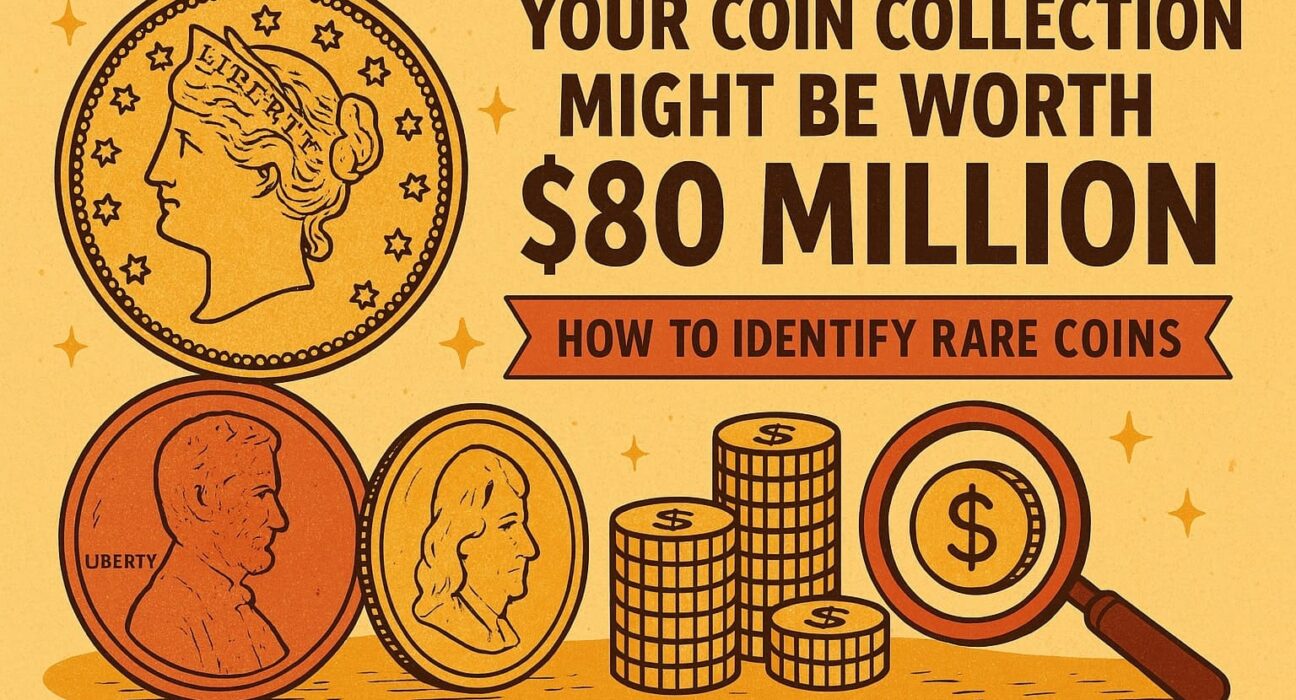Got a jar of old coins lying around? You might be sitting on a goldmine—literally. With rare coins fetching millions at global auctions, collectors and investors are now more eager than ever to uncover valuable pieces. Experts estimate that over $80 million worth of rare coins are still in circulation, possibly tucked away in attics, drawers, or coin albums across the world. If you’re wondering whether your coin collection could be part of this treasure, this guide will help you identify rare coins, evaluate their worth, and discover where to sell them for top dollar.
Key Factors That Make a Coin Valuable
To determine if your coin is worth more than face value, look for these defining features;
| Criteria | What to Look For |
|---|---|
| Date & Mint Mark | Certain years and mint locations like 1909-S VDB Lincoln Penny are extremely rare. |
| Minting Errors | Doubled dies, off-center strikes, and die cracks can significantly boost value. |
| Condition (Grade) | Coins graded MS60 or higher fetch premium prices. |
| Metal Content | Coins made of gold or silver hold intrinsic value. |
| Historical Significance | Coins from key historical periods or events are highly collectible. |
| Collector Demand | Popularity among collectors often determines price in the market. |
How to Identify Rare and Valuable Coins
1. Examine the Date & Mint Mark
Look for these key indicators on your coins:
- 1909-S VDB Lincoln Penny
- 1943 Copper Penny
- 1893-S Morgan Silver Dollar
- 1916-D Mercury Dime
Mint marks like “S” (San Francisco) or “D” (Denver) can drastically increase value.
2. Search for Minting Errors
Minting mistakes are worth big bucks. Watch for:
- 1955 Doubled Die Penny
- Off-Center Strikes
- Die Breaks/Cracks These errors are rare and highly sought after by collectors.
3. Evaluate the Coin’s Grade
Grading reflects a coin’s condition. Use services like PCGS or NGC to professionally grade your coins. Grades range from:
- P-1 (Poor) to MS-70 (Mint State Perfect)
Higher grades = higher value.
4. Test for Authenticity
Simple home tests include:
- Magnet Test (genuine silver/gold coins are not magnetic)
- Weight Test (compare to standard weight)
- Edge Check (reeded vs. smooth)
5. Use Reliable References
Trusted resources for coin identification:
- NGC Coin Explorer
- PCGS CoinFacts
- Red Book (Guide Book of United States Coins)
6. Get a Professional Appraisal
Visit a certified dealer or grading service to confirm authenticity and market value. Look for dealers from (Professional Numismatists Guild) for credibility.
Top 10 Rare Coins to Look For
| Coin | Year | Estimated Value |
|---|---|---|
| 1933 Saint-Gaudens Double Eagle | 1933 | $18.9 Million |
| 1794 Flowing Hair Silver Dollar | 1794 | $12 Million |
| 1913 Liberty Head Nickel | 1913 | $4.5 Million |
| 1894-S Barber Dime | 1894 | $1.9 Million |
| 1804 Silver Dollar | 1804 | $4.1 Million |
| 1943 Copper Penny | 1943 | $1.7 Million |
| 1955 Doubled Die Penny | 1955 | $1,200+ |
| 1927-D Saint-Gaudens Double Eagle | 1927 | $1.2 Million |
| 1870-S Seated Liberty Dollar | 1870 | $2 Million |
| 1796 Draped Bust Quarter | 1796 | $1.5 Million |
Where to Sell Rare Coins
🏛️ Auction Houses
🛒 Online Platforms
🏪 Local Coin Shops
Find certified dealers via PNG
💬 Coin Shows & Conventions
Events like the World’s Fair of Money are great for showcasing and selling.
How to Protect Your Coin Collection
• Use Protective Holders: Acid-free sleeves or coin albums
• Avoid Cleaning: Cleaning can destroy numismatic value
• Store in Dry Places: Prevent rust, corrosion, or fading
• Consider Insurance: For collections worth thousands or more
$2 Bills Worth Thousands: Check Your Wallet for These Rare and Valuable Notes in 2025
Frequently Asked Questions (FAQs)
Q1: How do I know if my coin is rare?
Check for rare dates, mint marks, and unique features like minting errors or limited mintage.
Q2: Should I clean my coins to improve their look?
No. Cleaning coins can damage their surface and reduce their value significantly.
Q3: Is it worth grading my coins?
Yes, especially for high-value or rare coins. Graded coins sell for more and provide authenticity.
Q4: Can I sell ungraded coins?
Yes, but they may fetch lower prices compared to professionally graded ones.
Q5: Are all old coins valuable?
No. Age alone doesn’t determine value—rarity, condition, and demand matter more.
Final Thoughts
Before you toss those old coins into a drawer, consider this: one small penny could be worth thousands—or even millions. With the right knowledge and tools, your everyday collection could transform into a valuable asset. Stay curious, research your coins, and don’t hesitate to seek professional advice. You might just be holding the next big auction blockbuster!
For more tips and tools, visit NGC Coin Explorer or PCGS CoinFacts.
